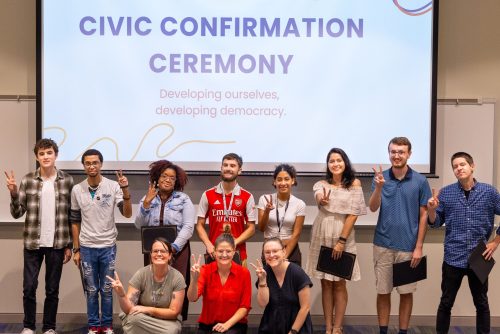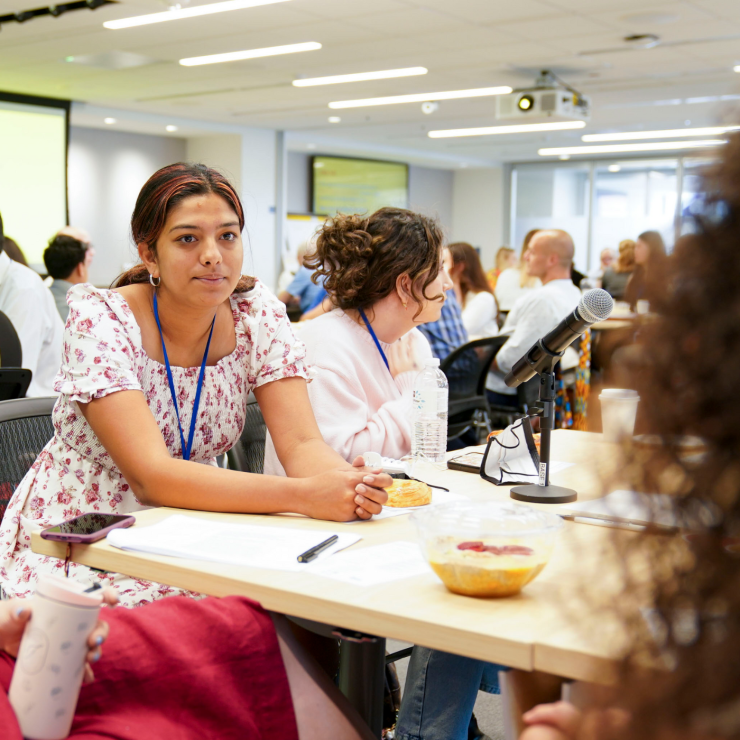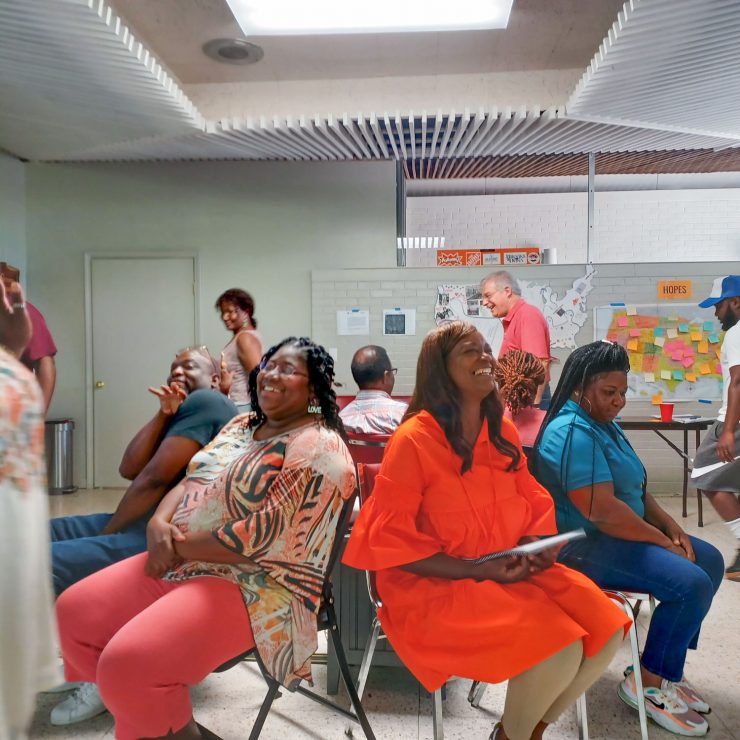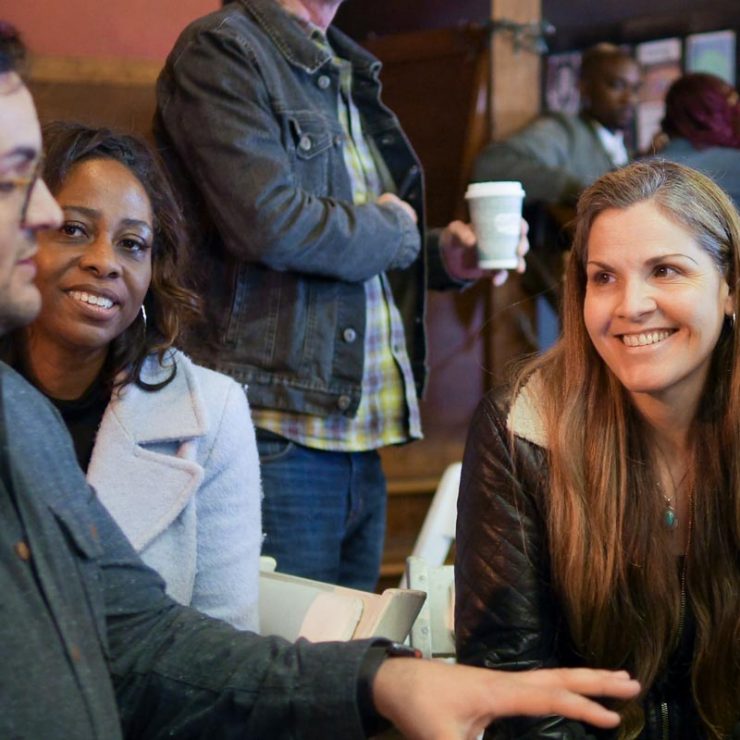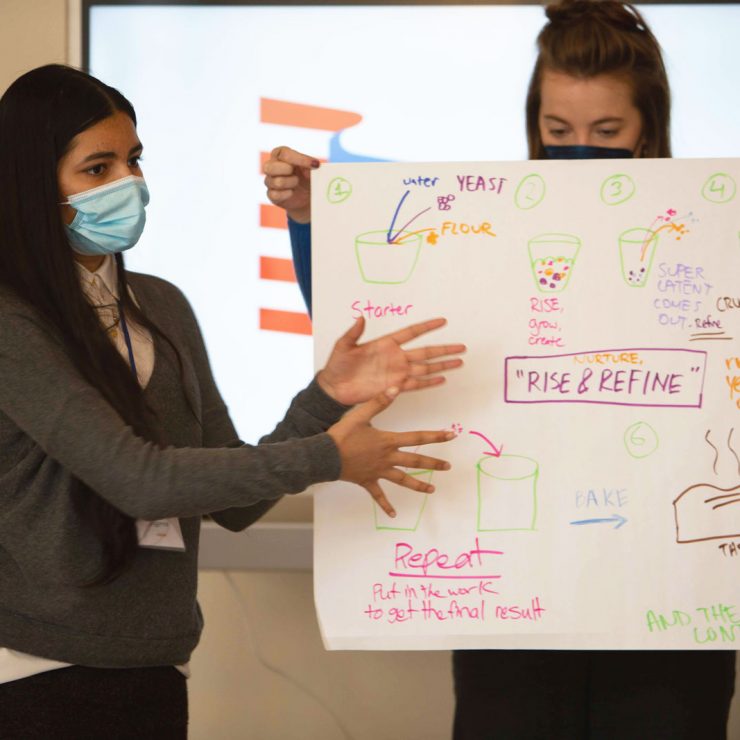It is a challenging time to be “coming of age” in America today. From feeling disconnected to disempowered, young people are grasping for ways to feel part of community and part of solutions. They’re yearning for the skills to create a future that works better for everyone.
Fortunately, a groundswell of educators, mentors, and others who work with young people are helping to meet this need. Through the Citizen Redefined approach, they are creating inviting, transformational experiences that enable young people to reckon with their role as young citizens — and define what that identity means for themselves.
Emma Cartwright is one of these civic catalysts. In her civic engagement role at a community college institution in North Carolina, she developed a Civic Leader Institute. It helped college students who felt like transplants become more meaningfully connected to their community and find their footing as dedicated, contributing members to society. Emma participated in our Citizen Redefined training program with other higher ed professionals through NC Campus Engagement in February of 2023.
Emma shared her insights with us on how she adapted and applied the curriculum to bring about civic transformation for these young Americans…
What challenges did you see your students facing? What was your motivation for bringing Citizen Redefined to North Carolina?
We noticed a need for programming that encouraged students to reimagine themselves as agents of change within their communities. While we saw students interested in service projects or volunteering, there was a disconnect between that service and the overall bigger picture. We weren’t providing them with the opportunity to link their co-curricular service with the crucial dialogue or skill development necessary for them to become engaged and active citizens.
Students saw themselves as powerless in regards to making social change happen. Many have the mentality that as one singular person, they can’t solve the larger societal issues, so why try? We also received feedback that the students wanted a safe space to discuss tough social issues. There was a lack of discussion space in their classes and the course structure made it difficult to form social bonds with other students.
How did your experience in the Citizen Redefined training equip you to meet these needs?
My week with Citizen University was transformational for my personal and professional development. I emerged with a better understanding of what true civic engagement meant and how to incorporate social justice, service, and community engagement. The ‘train the trainer’ model of teaching allowed me to experience the curriculum first hand and develop my own civic skills. I felt better equipped to create programming designed for student development. What wasn’t made evident until attending the Citizen Redefined training was that we need to help students develop crucial skills (problem solving, listening, critical thinking, self-advocacy) before we expect them to graduate ready for citizenship.
We need to help students develop crucial skills (problem solving, listening, critical thinking, self-advocacy) before we expect them to graduate ready for citizenship.
How did you tailor the curriculum for your specific community?
We used the curriculum to create the Civic Leader Institute (CLI). One of the major intended outcomes for CLI was for students to feel better connected to their surrounding communities through the inclusion of service. With this in mind, we split our days into three components. We used the Citizen Redefined curriculum to develop workshops for the morning session, had a community partner speak during lunch, then had tailored service projects during the afternoon sessions. Arranging the program this way allowed for students to comprehend the connection between civic skills development and their acts of service. For one of our sessions, we began by having students develop their deep listening skills through a civic skill workshop. The following service project allowed them to practice that deep listening with the local homeless population during a social event.
We also wanted to ensure that students left the program feeling connected to their campus community, so we used real local examples to tie into their civic skill workshops. Students were provided multiple opportunities to problem solve major social issues but using our college and their local community as a framework. For example, students worked in teams to map out the barriers to fellow students facing food insecurity on campus. They wrote mini-proposals for ways to improve access, knowledge of available resources, and service project ideas to help further fund food pantries.
Learn how you can bring Citizen Redefined to the young people in your community.
How did you see your student putting to use what they were experiencing?
Our students walked away from the program thinking, how can I use my power to make things better?
One student took the power-mapping experience with them into the classroom. Taking a statistics course, they chose to use an assignment as an opportunity to determine whether students knew about the campus food resources. They brought the findings to the appropriate leaders at the college and used it to advocate for changes in accessibility and awareness.
During one of our service outings, two students noticed instruments and spontaneously led a sing-a-long with the day program residents. It was a powerful moment of pure joy, where student leaders rallied a room of 30 people to sing ‘Lean on Me’.
Another student named Cody has been spearheading a Youth Climate Summit as a student at UNC-Charlotte. He has applied for grants, gathered support from the community, and began developing the programming centered around climate change. He initiated the entire program development and has been including other Civic Leaders throughout the Charlotte area. Here are some of his reflections…
Coming from a small town in the mountains I always knew everyone around me, but in Charlotte I didn’t feel like I had roots. I didn’t really have much idea how I could root myself in my local communities. The CIvic Leader Institute helped me reframe my idea of what community is.
Through the volunteering and non-profit organizations we worked with through the week, it shined a light on one of the most amazing qualities Charlotte has to offer — we are a community of doers and helpers who aim to raise each other up. Seeing this relationship and welcoming nature inspired me with more confidence to become involved, and even lead in my own organizations. Some of the relationships I made through CLI I still maintain and appreciate.
The biggest change that I made in my level of involvement was actively becoming a leader on projects I wanted to see come to fruition. One project specifically is organizing the first ever UNC Charlotte Youth Climate Summit, an intercollegiate two day summit to bring together students from the Charlotte region to empower them to leverage their voice and use the resources available to students that are provided by their colleges to implement sustainable change in the Charlotte region. The day I got to UNCC for fall semester of 2023, I hit the ground running and connected with clubs and organizations on campus to get the ball rolling on the Summit. Through this I became an officer for the Earth Club as Director of Youth Climate Summit Planning, a position we aim to pass on to the next generation of UNC Charlotte students upon graduation. We’ve even worked to take principles from CLI and apply them to the Youth Climate Summit in how we plan and organize, there will even be a workshop designed to be a mini-CLI instruction for student attendees. And I am constantly hearing from CLI members of projects or presentations they are working on, and some have even helped with the Youth Climate Summit!
The curriculum genuinely helps people be their best selves.
The curriculum genuinely helps people be their best selves — and at least gave me the confidence I needed to be involved. I don’t think it’s uncommon for many people to feel as if they’re on the outside looking in on their local communities. I also learned how to be a leader in the sense of giving other people the space and opportunity to work to their strengths and contribute in ways best fit for them. CLI taught me how to reach out and get involved with the organizations and support structures around me and it has actively changed my perspective for the better.
What are the biggest takeaways you saw in your students?
Active citizenship began to take on a new meaning to our students. Through the curriculum, the dialogues (both internal and external), and the service projects, students began to realize the importance of community engagement and their role as a citizen. We noticed students not only recognizing but internalizing their strengths and the varying ways for them to harness power within their communities. Listening to their civic declarations and seeing the pride beaming from their faces, further exemplifies the powerful impact this program had on them.
We noticed students not only recognizing but internalizing their strengths and the varying ways for them to harness power within their communities.
Every day we heard students draw upon their conversations from prior workshops, making connections between the civic skills, and reflecting upon the intersectionality of social issues. We saw shifts in students’ comfortability in civil dialogue and willingness to venture outside of one’s comfort zone happening daily. Most importantly, they were having fun and smiling throughout the entire week.
What is the future that you’re seeing because of this program?
Students who previously were not engaged on campus have begun to step into various leadership roles and become advocates in their communities. We have seen students joining the Student Government Association to form a women’s empowerment club on their campus. A few became dialogue ambassadors, leading conversations surrounding social change and developing student engagement programming to educate about inequities. Many have become regular volunteers at a local non-profit and rallying friends to volunteer alongside. I’ve had the honor of writing letters of recommendations for various service and community engagement based scholarships or leadership positions. I have no doubt that they are each utilizing their own power and civic skill set to make a ripple effect of change within their community. Witnessing their personal growth has made a lasting impact on me as an educator and a citizen.

Interested in bringing Citizen Redefined to your community? Learn more about the program and apply to be a hosting partner!
To connect with Emma about her experience, please get in touch: Emma Cartwright, Director of Service & Community Engagement, Lebanon, Pennsylvania ([email protected])
